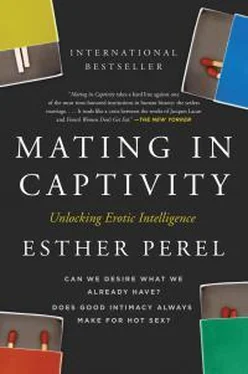“Just a minute,” he says.
“Don’t worry, I’m not suggesting tit for tat here,” I reassure him. “But your wife is a very attractive woman, and if you can’t see that, why shouldn’t she hear it from someone else?”
Along these same lines, I also suggest that they create new E-mail accounts reserved exclusively for erotic exchanges between them—their thoughts, memories, fantasies, and seductions. I point out that this correspondence is not meant to be about the problems in their relationship, it is meant to be a space for play. I want them to use cyberspace to elicit curiosity, a sense of intrigue, and a kind of wholesome anxiety. Writing has many advantages over talking. You get to say your fill, craft your response, and give voice in writing to things your lips dare not utter. It provides a built-in distance, and I hope this will help dismantle their inhibitions.
By Valentine’s Day Jackie has eased into the art of seduction. She’s playful and daring, not only in her E-mails with Philip, but with other men as well. Several months later she tells me, “Your urging me to get a sense of myself from other men besides Philip has been very good for me.” She started doing things with her male friends, going to concerts and galleries, and she has generally been more flirtatious. “Nothing big, you know, but it’s been fun to be out there again, talking to men who are not my husband, knowing they enjoy my company. And now, Philip’s every word or look isn’t the most important thing in my life.”
Jackie’s new confidence has left Philip slightly unmoored, and that turns out to be a good thing. He is intrigued by the way she writes to him, and is surprised to find that in the graphic lexicon of sex, she can certainly hold her own. All this sexualizes her in his eyes. Freed from the predictability of a script, he takes a second look. The pseudo anonymity of their E-mails has allowed him to see her as a subject with her own desires, turning her into the object of his desire. “I’m saying things to her that I never thought I could. I expected she’d be turned off, but she’s not. She needs a lot less taking care of than I projected onto her,” Philip admits. “I realized I put a lot of stuff on her that doesn’t belong to her. It belongs to me, or at least to my family.”
“I don’t get how your flings were supposed to be taking care of me, though I know in your mind it makes sense,” Jackie tells him. “It’s not OK, but I understand it. Still, I was always surprised at how easily you let yourself be caught. Like you were asking for it, so you could come to Mommy and get punished. I’m not interested in replaying your family drama. I’ll leave you first, and you know it.” To me she says, “Realizing I had the strength to leave helped me make the choice to stay. I have a lot more freedom. When I initiate sex now, I can feel almost brazen, and I like that. ‘You want this, Philip? Take it!’ It doesn’t have to be romantic or even particularly personal. I like a lot of different things. I prefer tender love, but sometimes greedy is good, too.”
I’ve worked with Jackie and Philip on and off for years. Philip has stopped acting out, and over time he has searched for ways to undo the deeply ingrained belief that hot sex can’t happen at home. By finding ways to experience himself as a sexual man who is also a faithful man, he was able to undo family patterns that were at least three generations old. In the past, Philip’s fascination with porn was a haven for him, a fantasy of immediacy where the moment of desire and satisfaction merged. The women on the screen offered no resistance and required no effort on his part. Hence the tension between wanting and getting was nullified, and Philip never had to reconcile desire in the context of love. Gradually, he has allowed the dislocated parts of his sexuality to come home, and has been more able to remain present with his wife.
The ongoing challenge for Jackie and Philip is to continue to bring the erotic home—to experience small transgressions, illicit striving, and passionate idealization in the midst of their intimate lives. The English analyst Adam Phillips underscores this point in his book Monogamy:
If it is the forbidden that is exciting—if desire is fundamentally transgressive—then the monogamous are like the very rich. They have to find their poverty. They have to starve themselves enough. In other words they have to work, if only to keep what is always too available sufficiently illicit to be interesting.
Can You Want What You Have?
Oscar Wilde wrote, “In this world there are only two tragedies. One is getting what one wants, and the other is not getting it.” When our desires are unfulfilled, we are disappointed. It’s frustrating to be denied a raise, a college acceptance, an audition. When the object of our desire is a person, her rejection leaves us feeling lonely, unworthy, unloved, or—worse—unlovable. But fulfilled desire carries its own brand of loss. Getting what we want undermines the thrill of wanting it. The deliciousness of yearning, the elaborate strategies of pursuit, the charged fantasies, in short all the activity and energy that went into wanting give way to the foreclosure of having. Just think about the last thing you had to have until you owned it. Now that it’s yours, you may enjoy it, you may love it, but do you still want it? Do you even remember how much you wanted it in the first place? Gail Godwin wrote, “The act of longing will always be more intense than the requiting of it.”
Is it harder to want what you already have? The law of diminishing returns tells us that increased frequency leads to decreased satisfaction. The more you use a product, the less satisfying each subsequent use will be. Paris just isn’t the same on your fifteenth trip as it was on the first. Fortunately, the logic of this argument breaks down when it is applied to love, for it is based on the erroneous assumption that we can own a person in the same way that we can own an iPod or a new pair of Prada heels. When my friend Jane said, “Perhaps I only want what I can’t have,” I responded, “What makes you think you have your husband?”
The grand illusion of committed love is that we think our partners are ours. In truth, their separateness is unassailable, and their mystery is forever ungraspable. As soon as we can begin to acknowledge this, sustained desire becomes a real possibility. It’s remarkable to me how a sudden threat to the status quo (an affair, an infatuation, a prolonged absence, or even a really good fight) can suddenly ignite desire. There’s nothing like the fear of loss to make those old shoes look new again.
The counterargument to the law of diminishing returns is the principle that consistent investment leads to increased satisfaction. The more you do something, and the better you get at it, the more you’re going to enjoy it. The weekly tennis player who continues to improve his game would argue for the positive effects of frequency. For her, Paris just keeps getting better. The more she practices, the stronger her skills. The stronger her skills, the deeper her confidence. The more confident she feels, the more risks she takes. The more risks she takes, the more exciting the game. Of course, all this practice takes effort and discipline. It is not just a matter of being in the mood; it requires patience and sustained attention. The tennis player knows intuitively that growth is rarely linear; she may experience some plateaus and some slowdowns, but the reward is worth the effort.
Unfortunately, all too often we associate effort with work, and discipline with pain. But there’s a different way to think of work. It can be creative and life-affirming, sparking a heightened sense of vitality rather than a bone-deep exhaustion. If we want sex to be fulfilling, then we have to apply effort in just this artful way.
Читать дальше










